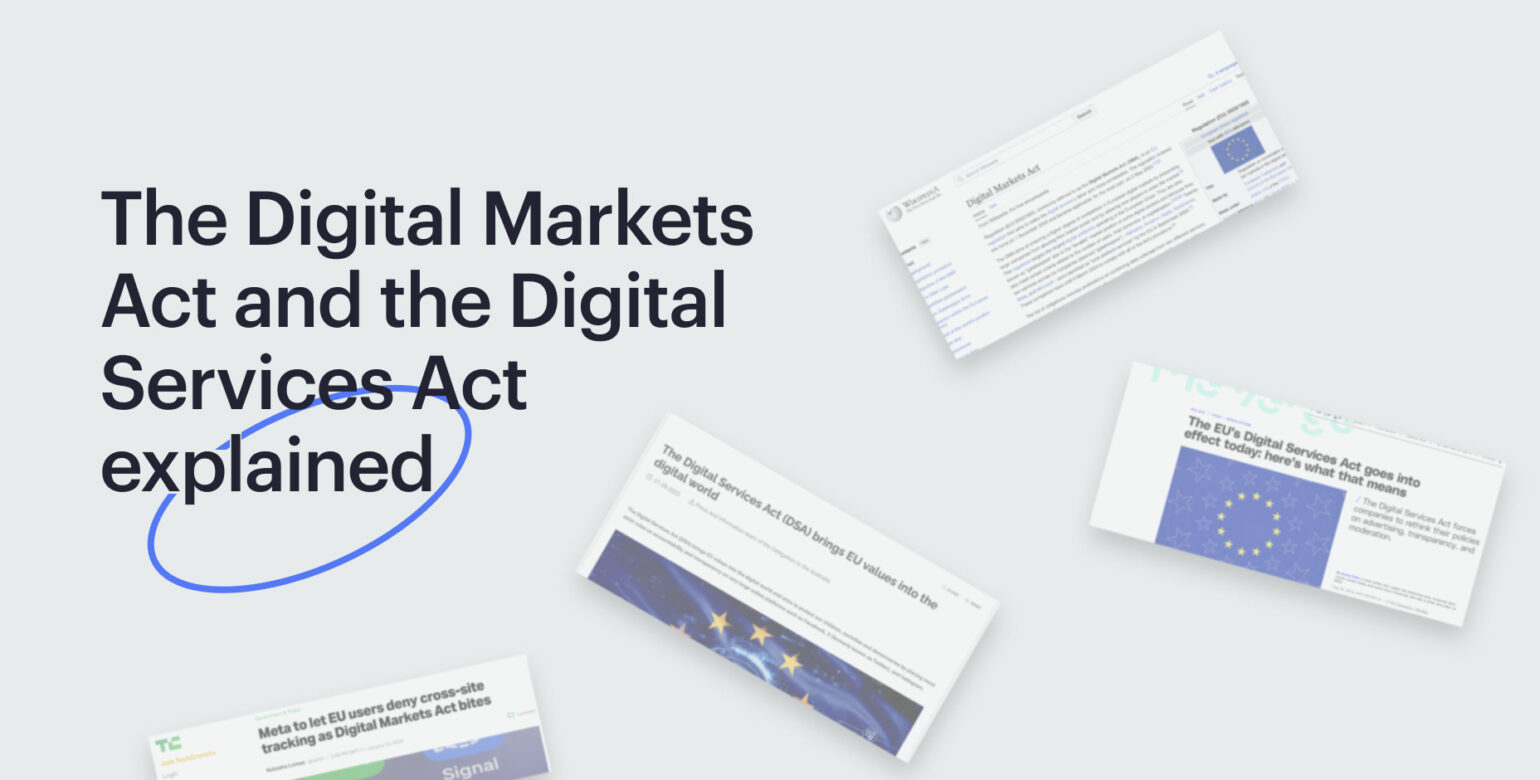The DMA & DSA and the implications for advertisers

Celina Belotti
Analytics Lead
The Digital Markets Act (DMA) and Digital Services Act (DSA) are two important pieces of European regulation that aim to improve competition, increase transparency and promote a healthy digital environment in Europe. In this blog post, we will dive into what these regulations entail and what opportunities and challenges they might bring for advertisers.
What are the DMA and DSA?
The Digital Markets Act (DMA) and the Digital Services Act (DSA) are particularly interesting for the digital marketing ecosystem in Europe because they address two complementary issues in the tech environment. While the DMA is a competition law, the DSA looks specifically at how digital services are delivered and how accountable companies are when it comes to the impact of their services. What makes these particularly unique is the fact that they introduce different obligations for different online platforms – the larger the company, the more significant the requirements. The DMA, for example, introduces the concept of a Gatekeeper: Companies that are so big and take up such prevalence in the market that they have an infrastructural character upon which other services can be built. Examples of companies that fall in this category are Google, Meta and Apple, and under the new legislation, they will have new requirements to play.
The Digital Markets Act:
The DMA is focused on regulating the digital market by imposing limitations and requirements on online platforms, particularly on big tech companies, such as Meta, Google, Apple, Amazon, and Microsoft. One of the most important parts of the DMA is the definition of a category of companies that qualify as “gatekeepers”. These are big companies that will have specific responsibilities and limitations, with respect to some of their core platform services, when operating in Europe. The DMA aims to ensure fair competition online and to improve the sustainability of the digital ecosystem in the European market.
The Digital Services Act:
On the other hand, the DSA is focused on regulating digital services. It aims to ensure that platforms have transparent algorithms, that users are protected, and that automated decisions are explained. The DSA is equally important and will also be disruptive to the digital ecosystem but in different ways.
When we wrote about this topic at the beginning of 2021, both the DSA and the DMA were only proposals. We’ve come a long way since then and although a lot of our predictions are still relevant, we now have a better picture of what implications these new rules might have. With hefty fines for online platforms in case of non-compliance, we think the DMA and DSA package could really shake up the industry.
Opportunities for advertisers
So, what opportunities might the DMA and DSA open for advertisers? One of the most evident opportunities is a consequence of improved transparency. Big companies will be forced to provide more transparency to advertisers around their media spend, targeting, and delivery of ads. This could be positive for advertisers in Europe and for the market in general. With AI becoming more prevalent in advertising, increased transparency could be a game changer when it comes to automated bidding.
Another opportunity that comes from transparency will be around modelling and attribution. With more open standards and reporting, technology providers such as Precis will have opportunities to create and use platform data, while building proprietary tech on top of it, which will benefit the ecosystem tremendously.
In relation to competition standards, we are also looking forward to seeing how companies like Apple will respond, since the DMA ensures that there is a playing field between networks operating separately. This might mean that Apple Search Ads will be forced to employ the same tracking limitations that Google has when running app campaigns on iOS devices, which could decrease the disparity between the two players. Advertisers should keep an eye on how this develops and how it might benefit their advertising efforts.
Things to pay attention to
There are also challenges that advertisers should be concerned about. One important factor to keep at the back of your head is consent. Google has announced that it will enforce new privacy requirements to all advertisers in Europe by requiring them to send consent parameters to the platforms using Consent Mode. Advertisers should also be mindful that connections between platforms owned by similar companies might be impacted, which means that audience quality might decrease, and advertising prices might increase in the next year.
Conclusion: A two-speed Europe
Finally, the DMA and DSA are officialising that Europe is at a different speed when it comes to privacy and data protection in relation to other countries, particularly the US. Advertisers will need to adapt their strategy to different markets and make sure that they have the correct setup. In the case of the DMA and the DSA, this might mean simply making tracking changes to implement Consent Mode, but also keeping a close eye on media buying prices, because they might increase in response to the regulations.
In conclusion, the DMA and DSA are important regulations that will bring both opportunities and challenges for advertisers. Advertisers should be aware of the changes and adapt their strategies accordingly to make the most out of these regulations. Learn more about how Precis can support you with upcoming privacy regulations.


